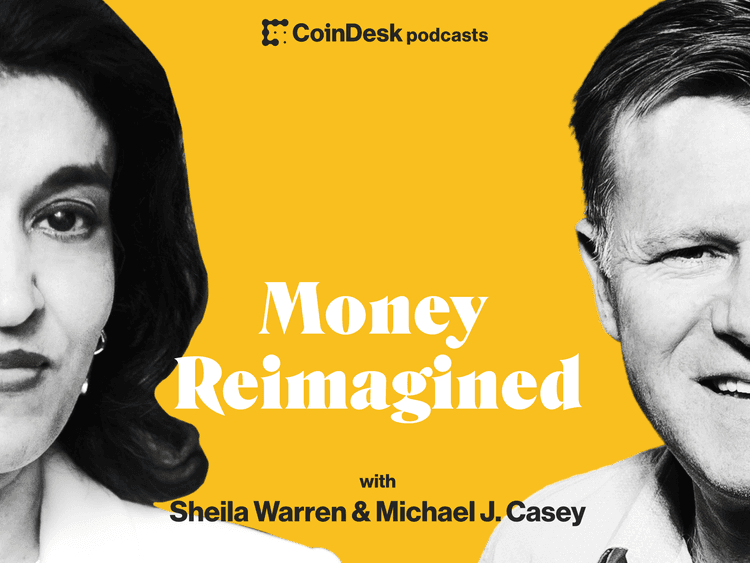And Just Like That, the US Has Become a Bitcoin Superpower
The U.S. has leapt into first place and China, the world leader just a few months ago, now has essentially zero mining capacity.
ABOUT
This week’s edition of “Money Reimagined” explores the ramifications of a startling shift in the rankings of the world’s top locations for bitcoin mining. The U.S. has leapt into first place and China, the world leader just a few months ago, now has essentially zero mining capacity following a regulatory crackdown there in June. Co-hosts Michael Casey and Sheila Warren talk to Justin Podhola, the CEO of Elite Mining, and George Kaloudis, who leads CoinDesk’s Bitcoin-focused research.
This episode is sponsored by Quantstamp.
The show keys off a report from the Cambridge Centre for Alternative Finance (CCAF) that found that as of the end of August, the U.S accounted for more than 35% of the global Bitcoin hashrate – a measure of the total worldwide computational power used to mine bitcoin – more than double its 16.8% stake at the end of April. Over the same period, the report says, China dropped from 46% of total hashrate to zero.
Another point of interest is the rise of alternative centers – in particular, Kazakhstan, which is now in second place with 18.1% of total hashrate, followed by Russia with 11%.
How can an industry with all that equipment and complicated energy needs move so quickly to a new location? What are the geopolitical implications of China’s bitcoin mining leadership – once as high as 75% of total hashrate – now being ceded to the U.S., Kazakhstan and Russia? What does this mean for regulation, especially in the U.S., where the chairman of the Securities and Exchange Commission, Gary Gensler, has been talking a hard line against crypto? Would the presence of a dominant, profitable and strategically important bitcoin industry sway policymakers toward being more or less crypto-friendly?
And, most important, to address a topic that we’ve dived into a number of times on “Money Reimagined”: Does this create an opportunity for the U.S. to lead the push for renewable energy-based mining, not only to make Bitcoin greener but to collaborate with energy developers to fund the expansion of a green grid more generally?
All that and more are discussed in this wide-ranging discussion.
This episode was produced and edited by Michele Musso with announcements by Adam B. Levine and additional production support by Eleanor Pahl. Our theme song is Shepard.
HOSTS
Michael J. Casey is Chairman of The Decentralized AI Society, former Chief Content Officer at CoinDesk and co-author of Our Biggest Fight: Reclaiming Liberty, Humanity, and Dignity in the Digital Age. Previously, Casey was the CEO of Streambed Media, a company he cofounded to develop provenance data for digital content. He was also a senior advisor at MIT Media Labs's Digital Currency Initiative and a senior lecturer at MIT Sloan School of Management. Prior to joining MIT, Casey spent 18 years at The Wall Street Journal, where his last position was as a senior columnist covering global economic affairs.
Casey has authored five books, including "The Age of Cryptocurrency: How Bitcoin and Digital Money are Challenging the Global Economic Order" and "The Truth Machine: The Blockchain and the Future of Everything," both co-authored with Paul Vigna.
Upon joining CoinDesk full time, Casey resigned from a variety of paid advisory positions. He maintains unpaid posts as an advisor to not-for-profit organizations, including MIT Media Lab's Digital Currency Initiative and The Deep Trust Alliance. He is a shareholder and non-executive chairman of Streambed Media.
Casey owns bitcoin.

EPISODES
Crypto's Future of Policy, Politics, and the Fight for a Pro-Crypto Government
Messari’s Ryan Selkis from Bitcoin to crypto policy.
Jun 14, 2024
Embracing Nuance and Logic | The Diverse Community of Crypto
Post-Consensus 2024 reflections and examining the crypto industry and the implications of the U.S. Presidential elect...
Jun 5, 2024
‘Tokenization Is the Future of Real Assets.’
Max Boonen, CEO, and Co-Founder PV01, shares the advancements in technology and the war over regulation for tokenizat...
May 22, 2024
Future-Proofing Finance: MICA, Crypto Disclosure, and Global Regulatory Challenges
Bluprynt CEO and Georgetown Law Professor, Christopher J Brummer highlights the crucial need for financial disclosure...
May 18, 2024

The Mining Pod
Feb 10, 2025

CoinDesk Podcast Network
The top stories and best shows in the blockchain world, delivered daily from the team at CoinDesk.
Dec 20, 2023

Markets Daily Crypto Roundup
Tune in as CoinDesk runs down daily action in bitcoin markets and some of the most important recent industry development.
Dec 19, 2023

Unchained
Unchained, your no hype resource for all things crypto by former Forbes senior editor Laura Shin, author of The Cryptopians.
Dec 18, 2023

